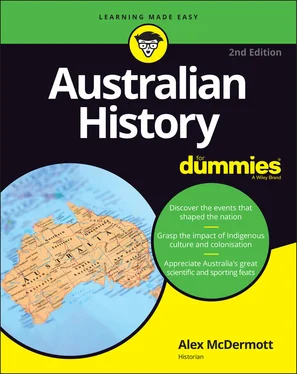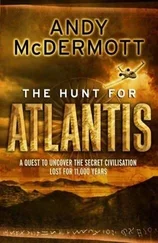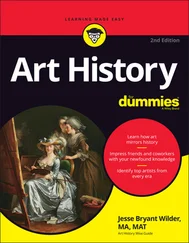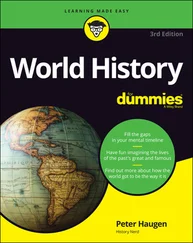But Hunter was pretty lazy when it came to governing this newly productive colony. During his time as governor, Hunter failed to
Manage the emerging trade and import market in the new colony
Ensure the newly established government store was restocked after initial supplies sold out
Control the distribution of land according to a well thought out plan — or any plan
However, Hunter’s lack of attention to detail actually had some positive effects for the colony.
Ending the trading monopoly game
When the administration of the new colony was in the hands of the NSW Corps, the officers in the Corps set up trading monopolies over all imported goods. On his arrival, Hunter made no attempt to control or manage the emerging trade, and issued no rulings on whether the monopolies should be broken or maintained.
However, failing to control trade actually had the positive effect of allowing the market to open up. The monopoly was broken not by a governor, nor an order issued from London, but by convicts and common soldiers made good — convicts and soldiers put in place, moreover, by the officers themselves.
 Because the officers prized so highly their status as ‘gentlemen’, they couldn’t be seen to be involved in trade, so they put their underlings and go-betweens in the cockpit. Convict servants and soldier privates didn’t take long to corner the market for themselves, quickly proving they were more than savvy enough to strike their own deals with ships’ captains once they’d built up enough capital to do so. They and newly arrived entrepreneurs from British India undercut the officers — who were furious, but couldn’t do much about it. (They’d started falling out among themselves by this stage, anyway.) The NSW Corps officers started getting out of the trading game, including the grog trade, and concentrated instead on developing their landed holdings.
Because the officers prized so highly their status as ‘gentlemen’, they couldn’t be seen to be involved in trade, so they put their underlings and go-betweens in the cockpit. Convict servants and soldier privates didn’t take long to corner the market for themselves, quickly proving they were more than savvy enough to strike their own deals with ships’ captains once they’d built up enough capital to do so. They and newly arrived entrepreneurs from British India undercut the officers — who were furious, but couldn’t do much about it. (They’d started falling out among themselves by this stage, anyway.) The NSW Corps officers started getting out of the trading game, including the grog trade, and concentrated instead on developing their landed holdings.
The rum monopoly was over. Yet no-one had told the powerful men in England that.
A government store with empty shelves
Skyrocketing inflation caused by the officers’ monopoly on imported goods (refer to preceding section) could have been mediated when Hunter established a government store, which provided farmers and others with reasonable prices for essential items ordered in from Britain, such as clothes, spirits, tea, tobacco and sugar.
But once the store ran out of its initial supplies, Hunter neglected to re-stock. Being unable to foresee that you’d need to order regular consignments of merchandise that were being widely used by the mass of the rural population is a telling failure.
Handing out land higgledy-piggledy
Phillip, who didn’t think much of convicts as settlers, had fairly strictly separated the areas where convicts, ex-convicts and free settlers would be given land to settle, and Grose and Paterson (as heads of the NSW Corps) had largely followed this process. Yet Hunter, through his negligence, shook up the established pattern of giving out land grants. Hunter didn’t follow any fixed rule when distributing grants — he just assigned grants higgledy-piggledy.
 This alteration had profound consequences. NSW society became increasingly homogenous (if not harmonious); the free and unfree and ex-unfree-but-now-free all mixed together to a remarkable degree. Completely by laxness and accident, the NSW populace became tightly knit. The colony seethed with the feuds, fights and factions common to all small outposts, but avoided any type of segregation or caste alignment, which turned out to be a very good thing indeed and became a defining feature of Australian society.
This alteration had profound consequences. NSW society became increasingly homogenous (if not harmonious); the free and unfree and ex-unfree-but-now-free all mixed together to a remarkable degree. Completely by laxness and accident, the NSW populace became tightly knit. The colony seethed with the feuds, fights and factions common to all small outposts, but avoided any type of segregation or caste alignment, which turned out to be a very good thing indeed and became a defining feature of Australian society.
 CRIMINALS OF GREAT ENTERPRISE
CRIMINALS OF GREAT ENTERPRISE
Young convicts coming to the new settlement in NSW found plenty of opportunities to make good. Often illiterate, without any great training or skills — beyond a sharp eye for the main chance, which had got them into trouble in the first place — individual convicts with enough luck, initiative and sheer hustling ambition began making their way up the colonial ladder, setting up lucrative businesses even as they were still serving their sentences. Here are two good examples.
Aged 19, Simeon Lord had been sentenced to seven years transportation for theft in Manchester in 1790. He’d been lucky not to be hanged, because the jury had deliberately underestimated the worth of the goods — 100 hundred yards (91 metres) of muslin and the same amount of calico was worth far more than the 10 pence it was valued at, but juries preferred to have a person transported rather than executed for such crimes. Getting to Sydney on the Third Fleet, he was assigned as servant to Officer Thomas Rowley, who obviously spotted a lad with sharpness about him and set him up as his retail frontman. Lord proved so valuable that when he was emancipated — sooner rather than later — Rowley set him up as a licensed victualler (supplier of goods) and baker. Officers purchased large amounts of cargos of merchandise and put it all in Lord’s hands to sell on commission, both wholesale and retail. Ship captains also found him useful, especially when they found out how much profit the officers were making off the imported goods. They started to bypass the officers and sell their goods by auction. Lord was the auctioneer, took 5 per cent for selling the cargo and collecting the bills, and built a huge warehouse on the site of Macquarie Place — and began making a killing selling from there. By 1806, Lord had a house bigger and more luxurious than the Governor’s residence, had bought ships and was trading with India, China, England, New Zealand and the Cape of South Africa.
Henry Kable was an illiterate man who arrived, aged 25, with his soon-to-be wife, Susannah Holmes, on the First Fleet. Phillip made him one of the constables of the early settlement. Soon he was running the gaol and selling liquor at steep prices to the drunks and malefactors that he locked up. In 1794 he was granted 30 acres at Petersham, and in 1799 he was appointed chief constable of the colony. Demoted for illegally importing pigs in 1802, his trading went on from strength to strength. In the early 1800s he became heavily involved in the new sealing industry, turning the sealskins into leather boots and shoes in a Sydney manufactory, and exporting sealskins to first Canton and Calcutta, and then London. By 1806 he employed five convicts, held 215 acres, and owned 10 horses and numerous cattle and sheep.
John Hunter, originally so enthused, found his inspiration waning as he became embroiled in a power struggle with the hustler-in-chief of the officers of the NSW Corps, John Macarthur.
 Having arrived in 1790 with a young family as part of the main body of the NSW Corps on the notorious Second Fleet, and highly ambitious with it, John Macarthur did much of the work under Grose, and later Paterson, to expand cultivation and make things highly lucrative for the officer cartel. Stationed at Parramatta in the rural hinterland, he had repeated run-ins with Reverend Marsden on policing convicts’ morality and other matters of order, decorum and discipline, and they cordially despised each other.
Having arrived in 1790 with a young family as part of the main body of the NSW Corps on the notorious Second Fleet, and highly ambitious with it, John Macarthur did much of the work under Grose, and later Paterson, to expand cultivation and make things highly lucrative for the officer cartel. Stationed at Parramatta in the rural hinterland, he had repeated run-ins with Reverend Marsden on policing convicts’ morality and other matters of order, decorum and discipline, and they cordially despised each other.
Читать дальше

 Because the officers prized so highly their status as ‘gentlemen’, they couldn’t be seen to be involved in trade, so they put their underlings and go-betweens in the cockpit. Convict servants and soldier privates didn’t take long to corner the market for themselves, quickly proving they were more than savvy enough to strike their own deals with ships’ captains once they’d built up enough capital to do so. They and newly arrived entrepreneurs from British India undercut the officers — who were furious, but couldn’t do much about it. (They’d started falling out among themselves by this stage, anyway.) The NSW Corps officers started getting out of the trading game, including the grog trade, and concentrated instead on developing their landed holdings.
Because the officers prized so highly their status as ‘gentlemen’, they couldn’t be seen to be involved in trade, so they put their underlings and go-betweens in the cockpit. Convict servants and soldier privates didn’t take long to corner the market for themselves, quickly proving they were more than savvy enough to strike their own deals with ships’ captains once they’d built up enough capital to do so. They and newly arrived entrepreneurs from British India undercut the officers — who were furious, but couldn’t do much about it. (They’d started falling out among themselves by this stage, anyway.) The NSW Corps officers started getting out of the trading game, including the grog trade, and concentrated instead on developing their landed holdings. This alteration had profound consequences. NSW society became increasingly homogenous (if not harmonious); the free and unfree and ex-unfree-but-now-free all mixed together to a remarkable degree. Completely by laxness and accident, the NSW populace became tightly knit. The colony seethed with the feuds, fights and factions common to all small outposts, but avoided any type of segregation or caste alignment, which turned out to be a very good thing indeed and became a defining feature of Australian society.
This alteration had profound consequences. NSW society became increasingly homogenous (if not harmonious); the free and unfree and ex-unfree-but-now-free all mixed together to a remarkable degree. Completely by laxness and accident, the NSW populace became tightly knit. The colony seethed with the feuds, fights and factions common to all small outposts, but avoided any type of segregation or caste alignment, which turned out to be a very good thing indeed and became a defining feature of Australian society.










